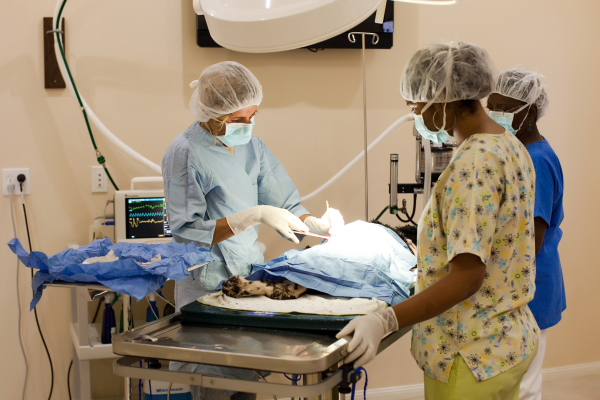What You Need to Know Before Your Pets’ Upcoming Surgery
Many people have questions about various aspects of their pets’ surgery, and we hope this information will help. It also explains the decisions you will need to make before your pets’ upcoming surgery.
Is the anesthetic safe?
- Today’s modern anesthetic monitors have made surgery much safer than in the past. Here at Sugar Mill Veterinary Center, we do a thorough physical exam on your pet before administering anesthetics, to ensure that a fever or other illness won’t be a problem. We also adjust the amount and type of anesthetic used depending on the health and age of your pet.
- Preanesthetic blood testing is important in reducing the risk of anesthesia. Every pet needs blood testing before surgery to ensure that the liver and kidneys can handle the anesthetic. Even apparently healthy animals can have serious organ system problems that cannot be detected without blood testing. If there is a problem, it is much better to find it before it causes anesthetic or surgical complications. Animals that have minor dysfunction will handle the anesthetic better if they receive IV fluids during surgery. If serious problems are detected, surgery can be postponed until the problem is corrected.
- We offer three levels of in-house blood testing before surgery, which we will go over with you when you bring your pet in. Our medical team prefers the more comprehensive screen, because it gives us the most information to ensure the safety of your pet. For geriatric or ill pets, additional blood tests, electrocardiograms, or x-rays may be required before surgery as well.
- It is important that surgery be done on an empty stomach to reduce the risk of vomiting during and after anesthesia. You will need to withhold food for at least 8 to 10 hours before surgery. Water can be left down for the pet until the morning of surgery.
Will my pet have stitches?
- For many surgeries, we use absorbable sutures underneath the skin. These will dissolve on their own, and do not need to be removed later. Some surgeries, especially tumor removals, do require skin stitches. With either type of suture, you will need to keep an eye on the incision for swelling or discharge. Most dogs and cats do not lick excessively or chew at the incision, but this is an occasional problem you will also need to watch for. If there are skin sutures, these will usually be removed 7 to 10 days after surgery. You will also need to limit your pets’ activity level for a time, and no bathing is allowed for the first 10 days after surgery.
Will my pet be in pain?
- Anything that causes pain in people can be expected to cause pain in animals. Pets may not show the same symptoms of pain as people do; they usually don’t whine or cry, but you can be sure they feel it. Pain medications needed will depend on the surgery performed. Major procedures require more pain relief than things like minor lacerations.
- We administer a pain injection 10 minutes prior to surgery. For dogs, we may recommend an oral anti-inflamatory the day after surgery and for several days following, to lessen the risk of discomfort and swelling. We use newer medications, which are less likely to cause stomach upset and can be given even the morning of surgery. The cost of the medication ranges depending on the size of your dog.
- Because cats do not tolerate standard pain medications such as aspirin, ibuprofen, or Tylenol, we are limited in what we can give them. Recent advances in pain medications have allowed for better pain control in cats than ever before. We administer a pain injection 10 minutes prior to surgery. After surgery, pain medication is given to cats on a case by case basis. Any animal that appears painful will receive additional pain medication.
- Injectable pain medications may also be used after surgery on both dogs and cats. Providing whatever pain relief is appropriate is a humane and caring thing to do for your pet.
What other decisions do I need to make?
- While your pet is under anesthesia, it is the ideal time to perform other minor procedures, such as dentistry, ear cleaning, or implanting an identification microchip. If you would like an estimate for these extra services, please call ahead of time. This is especially important if the person dropping the pet off for surgery is not the primary decision maker for the pet’s care.
- When you bring your pet in for surgery, we will need 5 to 10 minutes of your time to make decisions on the blood testing and other options available. When you pick up your pet after surgery you can also plan to spend about 10 minutes to go over your pets’ post-operative home care needs.
- We will call you the day before your scheduled surgery appointment, to confirm the time you will be dropping your pet off, and to answer any questions that you might have. In the meantime, please don’t hesitate to call us with any questions about your pets’ health or upcoming surgery.




